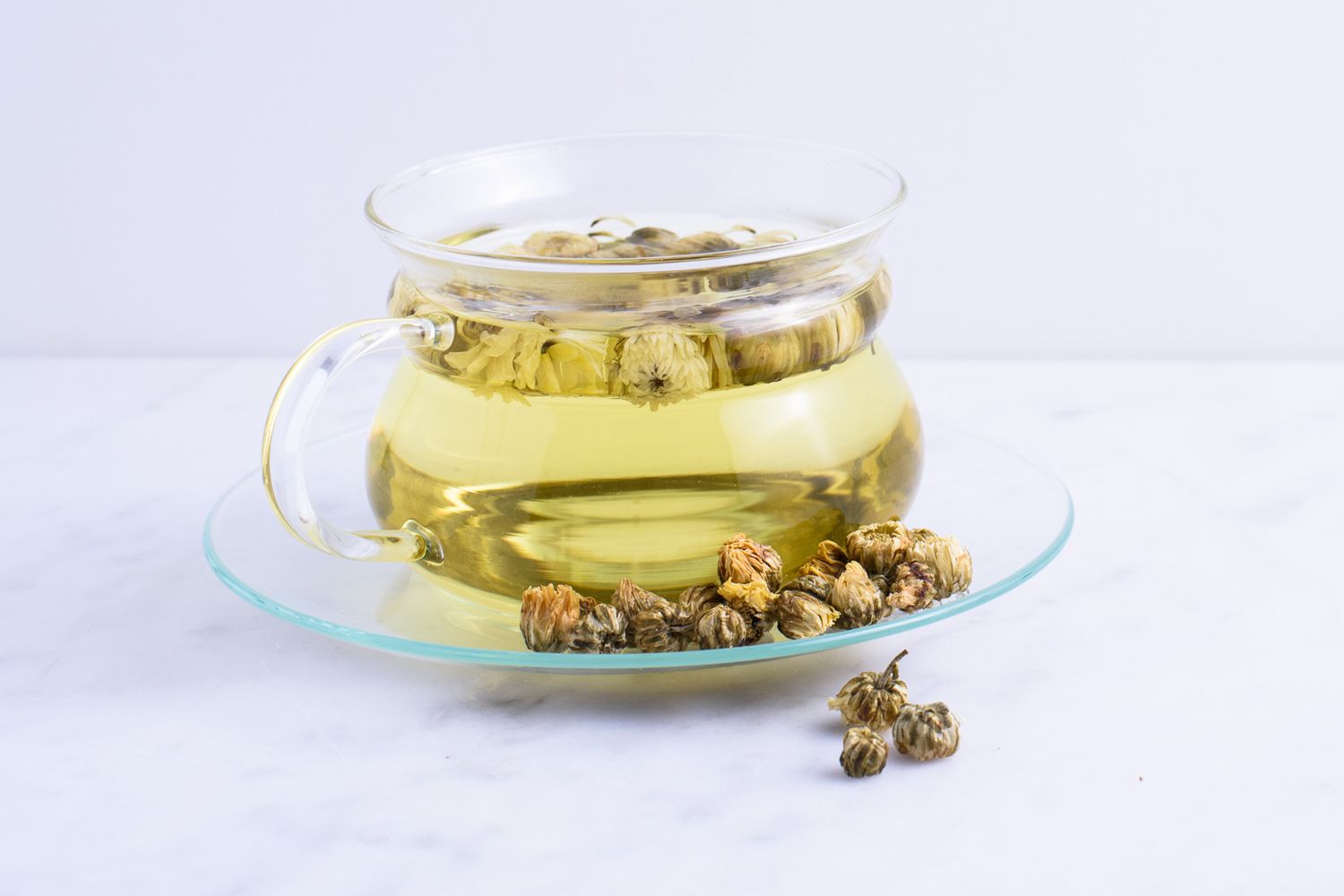Chrysanthemum Tea Benefits and Side Effects

Verywell / Alexandra Shytsman
Chrysanthemum tea is an infusion drink prepared by pouring hot water over dried chrysanthemum flowers. A popular summertime drink in China, the tea has been used in Chinese medicine to treat a variety of conditions. However, not all chrysanthemum tea benefits are supported by scientific evidence.
What Is Chrysanthemum Tea?
Chrysanthemum tea is not made from tea leaves as you would expect. Instead, this infusion tea is made from flowers of the chrysanthemum plant. Chrysanthemums, or mums, are a perennial plant related to the sunflower family and are known for their bright blossoms.
Chrysanthemum tea has been used in traditional Chinese medicine for hundreds of years. In addition, chrysanthemum is often combined with other herbs. These combinations are also often touted as treating a range of serious conditions.
Chrysanthemum Tea Health Benefits
While the health benefits of chrysanthemum tea are widely promoted, few of those benefits are supported by strong clinical evidence. Many claims about the drink are based on limited studies or personal reports regarding Chinese chrysanthemum (in a variety of forms) combined with other herbal ingredients.
More research is needed to see if chrysanthemum tea can positively affect blood sugar levels and even precancerous gastric mucosal lesions. Because research is sparse and preliminary, experts advise there is not enough evidence to support using chrysanthemum to treat stomach cancer or any other type of cancer.
The Natural Medicines Comprehensive Database also advises that there is not enough scientific evidence to support using chrysanthemum for treatment of other conditions often touted.
Does it Contain Caffeine?
Chrysanthemum tea is a floral infusion and not a true tea made from leaves of the Camellia sinensis plant. As such, there is no caffeine in the beverage.
Chrysanthemum Tea Side Effects
It is possible to experience certain side effects if you consume chrysanthemum or handle it to prepare your tea. You may suffer from a skin rash (also called contact dermatitis), including redness, swelling, or itching. You may also experience an increased sensitivity to sunlight and an increased chance of getting a sunburn.
You should not consume chrysanthemum if you are taking drugs to suppress the immune system or if you are allergic to ragweed.
There is not enough evidence to know that consuming chrysanthemum over the long term is safe.
How to Prepare Chrysanthemum Tea
To make your own chrysanthemum tea, place dried, whole chrysanthemum flowers in a cup or teapot and pour boiling water over them. Allow the flowers to steep for several minutes until the tea turns a golden yellow color. Add sugar, if desired.
One ounce of dried chrysanthemum flowers makes approximately 20, 8-ounce cups of tea. The tea has a light floral aroma and a gentle sweetness.
A Word From Verywell
Some tea drinkers may gain relief from certain symptoms when they drink chrysanthemum tea. But it is always hard to say if they got relief from their symptoms from the tea or from other circumstances. It can be tempting to reach for a natural treatment for illness, but in some cases, the natural treatment can do more harm than good.
If you are living with a health condition and prefer to get relief using an alternative treatment, talk to your healthcare provider. Many physicians and nurses are familiar with traditional Chinese treatments and may be able to guide you to the safest, most effective treatment for you.
Chrysanthemum. Therapeutic Research Center. Natural Medicines Database. https://naturalmedicines.therapeuticresearch.com/databases/food,-herbs-supplements/professional.aspx?productid=904
Chrysanthemum. Memorial Sloan Kettering Integrative Medicine About Herbs, Botanicals & Other Products. https://www.mskcc.org/cancer-care/integrative-medicine/herbs/chrysanthemum
:max_bytes(150000):strip_icc()/Malia-Frey_1000-2f7768d8777a4ebbac39d628bc31b714.jpg)
:max_bytes(150000):strip_icc()/Willow-Jarosh_1000-56bb5d655a6d4ee0afb08563089e2693.jpg)
:max_bytes(150000):strip_icc()/Malia-Frey_1000-2f7768d8777a4ebbac39d628bc31b714.jpg)
:max_bytes(150000):strip_icc()/soursop-tea-crop-52ccccae4c4b4d39b1e8e274a7e9d9e9.jpg)
:max_bytes(150000):strip_icc()/burdock-tea-crop-6ac8598eec134f40b5906df9dce8d9fb.jpg)
:max_bytes(150000):strip_icc()/GettyImages-200478629-001-579894cb3df78ceb8636cccf.jpg)
:max_bytes(150000):strip_icc()/best-green-teas-5115813_Fit-80af7f827cec4637b5cc18fa1bd1800a.jpg)
:max_bytes(150000):strip_icc()/eucalyptus-crop-fa3e4368724148c4849579811cf8e04a.jpg)
:max_bytes(150000):strip_icc()/jasmine-tea-crop-10c10ccc6d074edc98e70cd35e725185.jpg)
:max_bytes(150000):strip_icc()/garlic-tea-crop-dbc6c508fab34177844b91822a79617c.jpg)
:max_bytes(150000):strip_icc()/GettyImages-1471979246-0638519142bd4a9aa3af64af45750889.jpeg)
:max_bytes(150000):strip_icc()/assam-tea-crop-8154d3c7e4e94522bc8383d7febcb7cb.jpg)
:max_bytes(150000):strip_icc()/ginger-tea-crop-9f7de32f65ad415ba2758375ffb0ed44.jpg)
:max_bytes(150000):strip_icc()/sassafras-tea-jpg-e31b5f49a5704662801ba25fedf2fc36.jpg)
:max_bytes(150000):strip_icc()/mint-tea-crop-bddab4528eaa43cd98d595b2daefdde2.jpg)
:max_bytes(150000):strip_icc()/comfrey-tea-crop-7818964240754fb8ac3f4bee94030ea5.jpg)
:max_bytes(150000):strip_icc()/parsley_crop-45ea8d9db1a24f82aba1a605db753bbf.jpg)
:max_bytes(150000):strip_icc()/green-tea-crop-6cfd8a91bd3641e4ad228f0aa4fcf4db.jpg)
:max_bytes(150000):strip_icc()/barley-tea-crop-6f7621fc15624df495681e954a8bc022.jpg)